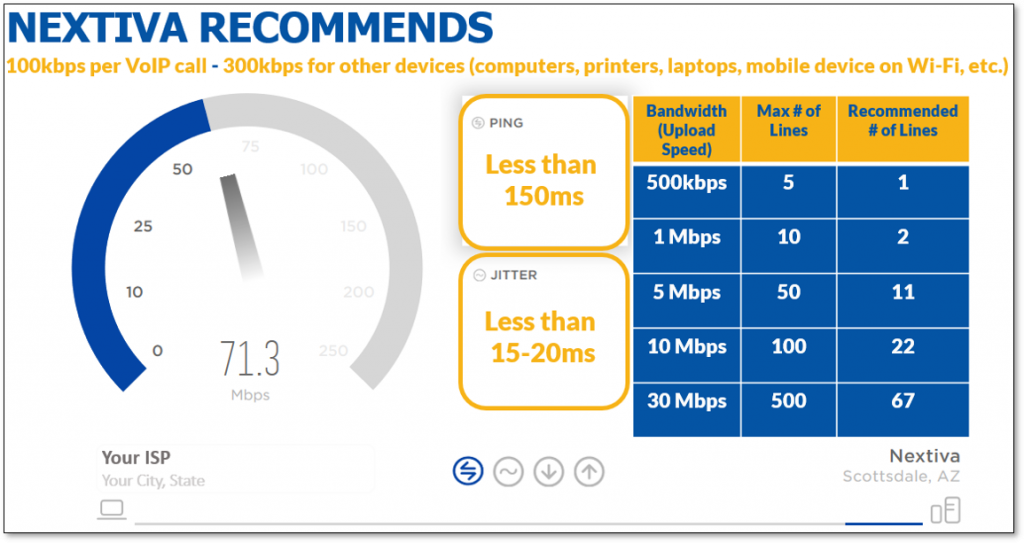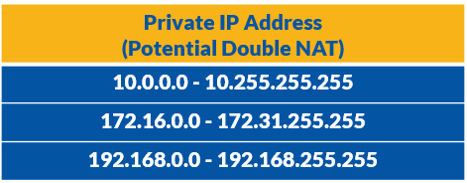Customers who are experiencing dropped calls can also see symptoms that may include fast busy signals, dead air, and choppy audio followed by call disconnection. Common causes include configuration and stability within the customer’s network.
In this article, we’ll explore some typical troubleshooting steps, including:
- Verifying the local network quality: Bandwidth, Packet Loss, and Jitter.
- Removing Double NAT.
- Disabling SIP ALG.
- Escalating: Submit a Ticket.
Verifying the Local Network Quality: Bandwidth, Packet Loss, and Jitter
The underlying Internet connection from a local ISP is the most critical factor in delivering high-quality audio to Nextiva customers. Low bandwidth, packet loss, or jitter will cause choppy audio, voice delays, echoing, and dropped calls.
To verify the integrity of the local network with the Nextiva Network Quality Speed Test, click here. Compare the results with the chart below. Please note, running a speed test is similar to taking a snapshot. Multiple tests should be run at peak times of day or while issues are actively happening.

Recommended Network Quality Speed Test Results
To learn more about Bandwidth, click here.
To learn more about Packet Loss, click here.
To learn more about Jitter, click here.
Removing Double NAT
Double NAT (Network Address Translation) causes intermittent issues that include but are not limited to:
- One-way audio
- Phone deregistration
- Unsuccessful transfers
- Error messages when dialing a phone number
- Call Groups not ringing properly
- Dropped calls
Routers and Gateways are both pieces of networking equipment that perform NAT, which helps route incoming Internet traffic to the correct device on the local network. Nextiva recommends that a Network Administrator ensure the WAN IP of the local network is an IP address that falls outside the private address ranges in the chart below:

WAN IP in These Ranges Suggests a Potential Double NAT.
To learn more about Double NAT, click here.
Disabling SIP ALG
Nextiva recommends that a Network Administrator familiar with the local networking equipment disable SIP ALG on the router or firewall. To resolve most SIP ALG issues, Nextiva sends VoIP traffic over port 5062 instead of 5060 (which the SIP ALG setting affects). Even with this safeguard, SIP ALG can cause one-way audio, deregistrations, and dropped calls.
To learn more about SIP ALG, click here.
Submit a Ticket
If issues persist after reviewing the steps above, have a Network Administrator collect the information outlined below and email support@nextiva.com.
Network Information:
- ISP:
- Modem (make/model):
- Router (make/model):
- WAN IP: (Go to www.whatismyip.com.)
- Switches [(If applicable) make/model]:
- Download Speed:
- Upload Speed:
- Packet loss:
- Ping:
- Jitter:
Phone Information:
- Phones (make/model):
- Do the phones have Static IPs?
- How many phones are experiencing dropped calls?
- Are all phones connected to the same network?
Call Example:
- Dialing Party Phone Number:
- Receiving Party Phone Number
- Time:
- Date:
- Call Duration: